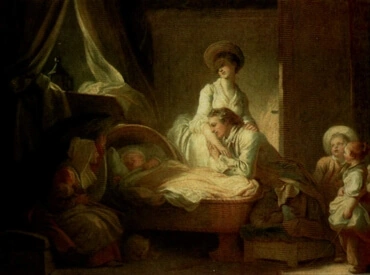In a general sense, being "born" in the Bible represents one spiritual state producing another, usually some form of love or affection producing or "giving birth" to truth or to desires for good. This is not hard to see: If you love someone, that love naturally gives birth to ideas on how to be good to that person and make him or her happy. This is why sons and daughters in the Bible represent true ideas and desires for good. On a higher level, though, being born represents what the Writings call "regeneration," or the life-long process of putting off our natural thoughts and desires and embracing spiritual life from the Lord. This is what the Bible means when it talks about being "born again" – if we live our lives from the Lord, He will eventually take away our evil desires so that we can be "born" as angels in heaven, free of evil desires and dark thoughts. Of course, these two levels of meaning are really one: The Lord is love itself, and if we align with Him we become forms of love and truth ourselves, expressions of His love just as the desire to do something good might be the expression of your love for a friend.
Arcana Coelestia #5348
5348. 'And to Joseph were born two sons' means the good and truth born from this, that is to say, from the influx of the celestial of the spiritual into the natural. This is clear from the meaning of 'being born' as being reborn, and so the birth of truth derived from good or faith derived from charity, dealt with in 4070, 4668, 5160 (for the generations described in the Word are spiritual ones, see 1145, 1255, 1330, 3263, 3279, 3860, 3866); and from the meaning of 'sons', who in this case are Manasseh and Ephraim, as good and truth, dealt with immediately below. For 'Manasseh' means the area of will belonging to the new natural, while 'Ephraim' means the area of understanding belonging to it. Or what amounts to the same, 'Manasseh' means the good present in the new natural, since good exists as an attribute of the will, while 'Ephraim' means the truth present there, since truth exists as an attribute of the understanding. One reads in other places about the birth of two sons. Good is meant by one, truth by the other, as for instance with Esau and Jacob. 'Esau' means good, see 3302, 3322, 3494, 3504, 3576, 3599, while 'Jacob' means truth, 3305, 3509, 3525, 3546, 3576. The like is meant by Judah's two sons by Tamar, Perez and Zerah, 4927-4929; and the same applies here in the case of Manasseh and Ephraim. The birth of these is dealt with here because the subject in what went immediately before this was the influx of the celestial of the spiritual into the natural and the consequent rebirth of it, which is effected solely by means of good and truth.
Arcana Coelestia #3210
3210. 'And Isaac brought her into the tent of Sarah his mother' means the sanctuary of truth within the Divine Human. This is clear from the meaning of 'a tent' as that which is holy, dealt with in 414, 1102, 2145, 2152, 2576, and so the sanctuary; and from meaning of 'Sarah his mother' as Divine truth, dealt with in 1468, 1901, 2063, 2065, 2904, from which the Divine Human was born, the Rational of which is represented by 'the son Isaac'. From this it is evident that 'Isaac brought her into the tent of Sarah his mother' means that rational Good guided Truth represented by Rebekah into the sanctuary of truth. What the sanctuary of truth is becomes clear from what has been stated above in 3194 about the Lord's Divine Human - that Good and Truth belong essentially to the Divine itself, but that the Lord's Divine Human came into existence from Divine Good and was born (as to the Divine itself, that is) from Divine Truth; or what amounts to the same, that the Lord's Essential Being (Esse) was Divine Good, but the Manifestation (Existere) of Him was Divine Truth. From this came Divine Rational Good to which He joined Divine Truth from the Human.
[2] It is impossible to say anything more about this very deep arcanum than this: Divine Good and Truth themselves within the Lord's Divine Human to which Truth from the Human was joined are what were meant by the Sanctuary or Holy of Holies in the Tabernacle and in the Temple. The nature of that Good and Truth was represented by the objects within the Sanctuary, such as the golden altar, the table with the loaves of the presence, and the lampstand; and further within, by the Mercy Seat and the Ark; and within it, inmostly, by the Testimony which was the Law delivered from Sinai. This was the Holy of Holies itself or Sanctuary of Truth.







